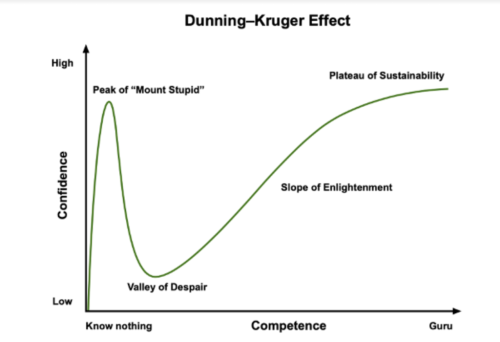
Kaizen in Everything. But Why?
“The only true test of intelligence is if you get what you want out of life.” – Naval Ravikant
Strength and Conditioning is a science, and science is constantly changing and evolving, as we attempt to understand the physical body, the mind and the world around us. So, it’s literally IMPOSSIBLE to know everything there is to know in S&C and Sport Science. Anyone that tells you that they know it all, is a liar. Anyone that acts like they know it all is a dickhead. Imposter syndrome is normal in your first few years in the industry, but as long as your method for combating feelings of inadequacy is to double down on developing in areas where you feel most out of depth, then you’ll be just fine.
Due to the job-market in S&C being highly competitive and the preference of organizations to hire, fire and rehire in their pursuit of the perfect S&C coaching team, the industry isn’t all that lucrative, if financial gain is your main priority. However, that’s not to say that you should attempt to be the selfless martyr that the industry seems to promote, and work purely for passion and next to nothing in financial reimbursement. Your biggest asset in any negotiation is your ability to walk away. So know your worth, don’t accept anything less than that for your time, and just prove your quality again and again with the work that you do, so that you have more pulling power at your next contract negotiation.
Let’s be honest, that first job is not going to pay well, and it’s going to seem like a hell of a lot of work in comparison to the lazing about and cramming that you did in college. Now that the Bank of Mum and Dad has officially closed its doors to you, you’re going to feel under pressure to start earning the big bucks that’ll help you to survive and then thrive in your twenties. However, in the S&C industry, it’s useful to know that you’ll likely have to play the long-game. Those first couple of years in the industry are the best time to throw yourself into as much coaching as possible. If someone asks you if you can do something during this time, you always say yes. Try different things, figure out what works and what doesn’t, read, reflect and if it doesn’t work out, who really gives a shit anyway? If you’re working in an organization that doesn’t seem to be the right fit at the moment, be persistent and tough it out for at least the season/year. Use it as an opportunity to grow in as many areas as you can and you’ll be ready to take on the next challenge when it presents itself to you.
As said above, you’re never going to feel like you’re the finished article as a coach, and if you do then you’re probably doing something wrong. Every team, sport and athlete presents a different problem and requires a slightly different solution. Take every challenge as it comes, use what you have learned already to your advantage and understand that what worked before, may never work again. Your ability to coach is not your ability to get the athlete to fit into your model, but to mould your model about the athlete. However, at the beginning just throw yourself into as many unnerving situations as you can. It’s amazing what a bit of urgency can do to a man’s ability to learn and convey new information. If you see a problem, attempt to fix it. If you can’t fix it, then at least you know and you can try something else.
Nobody cares how much you know, until they know how much you care. People will be reluctant to follow your lead, until they trust you. There are many ways of building trust. Sometimes it will be easier than others. A simple joke, a question asked at the right time, a casual chat about something completely unrelated. Your clients and athletes are always assessing you, so you do have to be careful what you say, but always be authentic to yourself in how you do things.
After you’ve built their trust, it’s all about teaching. I’m so glad that I got the opportunity to teach before I began my coaching career. The similarities between the two are endless. It’s no coincidence that the majority of successful sports coaches were once schoolteachers. Know the psychology behind the process of teaching and learning and understand that everyone learns differently. Understand, Simplify, Convey, Question. Easy.
Questions. You’ll learn to value them more than any other tool in your toolbox. The more information you have, the better you’ll be able to understand your clients and alter your systems and processes to meet their needs. However, it’s not always about quantity of information, but rather the quality of it. If something you’re asking isn’t useful in some way, don’t be afraid to throw it out. It can be exhausting to sift through huge amounts of information in search of what you really need.
Everyone goes through different challenges and learns from them throughout life. Just as it’s impossible to know everything, it’s impossible to be the best at everything as well. Each person in the organization adds value in their own unique way. Treat the janitor and interns with the same respect that you give to the head coach, and you’ll go far, no matter where you are. You never know where your next piece of useful information will come from, so be attentive to everything that’s happening in the world around you.
Don’t get married to an exercise. You’ll likely be doing something completely different in a year’s time. Use yourself and your clients as human guinea pigs. Hold onto what you find useful and don’t knock anything until you’ve tried it. However, as you gain more experience, you’ll likely be better able to spot the bullshit from a mile away.
Just because something worked with the last 10 clients/athletes, doesn’t mean that it will work with the next one. Be prepared to be doing totally different things with separate clients, sometimes even if they have the same problem/injury. Again, mould and adapt your coaching system around them, rather than trying to fit a square peg in a round hole. You will always have to be client-centred in your approach, but know when to say, “ok this isn’t working” and then reassess.
Sleep is your best friend, coffee is your saviour. However, don’t get too attached to either one. You can’t preach about healthy lifestyle choices whilst your bouncing off the walls from your 5th espresso of the day. Likewise, you can’t preach at all, if you’re not there and at home in bed. If you want to be an effective coach, I’m afraid adherence to a regular sleep schedule is a massive determining factor. No more staying up until 3am watching videos of Michael Jordan dunking on Youtube.

“The only true test of intelligence is if you get what you want out of life.” – Naval Ravikant

So, we can see that when it comes to our training, a certain volume of work when paired with adequate recovery is positive for our development, but if that same intensity of work is mismanaged and spiked, then the same exercise intensity can be toxic to the athlete.

Unfortunately, it takes a fall from the peak of mount stupid, on top of the Dunning-Kruger curve, for many of these lessons to land home.
Here to help you achieve your health and performance goals.
At Petey Performance, I’ll assist you every step of the way. What’s stopping you?
Take ownership today.
© 2021 All Rights Reserved
Subscribe to Petey Performance and get updates on new posts plus more exlusive content.